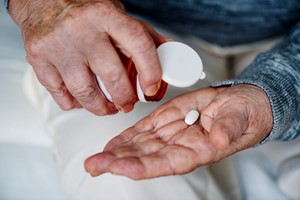New research links some beta-blockers and antiplatelet medications with a higher risk of experiencing a heart attack in hot weather.
Despite being used to treat cardiovascular conditions and reduce the risk of a heart attack, beta-blockers and antiplatelet medications have been shown to increase the risk of heart attacks in very hot weather, according to a new study published in the journal Nature Cardiovascular Research.
This was especially apparent for younger adults, who were more likely to have a heart attack under these conditions, according to the study.
“Patients taking these two medications have higher risk,” said Kai Chen, author an assistant professor in the Department of Epidemiology (Environmental Health) at the Yale School of Public Health, in a press release. “During heat waves, they should really take precautions.”
Air conditioning units, pools, and other cooling options would be useful to people on this medication or those prone to heart attacks. Epidemiologists are still trying to determine which populations and conditions are most vulnerable to extreme weather events.
In previous studies, researchers have found that hot and cold exposure increased the rate of heart attacks. Considering global warming, they predicted a global temperature increase of 2 to 3 degrees Celsius would make heat-related heart-attacks rates go up even more, especially among people with cardiovascular disease.
For this study, investigators looked specifically at the relationship between taking medication prior to heart attacks and hot weather. Using registry data from 2001-2014, researchers looked at 2494 people in Augsburg, Germany who suffered from non-fatal heart attacks during May-September, the hot weather months.
Patients were their own controls in this experiment. The study authors compared the temperature on the day of the week that the heart attack was experienced with the temperature of other control days during that month.
Participants taking these drugs were more likely to suffer a heart attack on the hottest days compared to the control days. Antiplatelet medications increased the risk of a heart attack by 63%, and beta-blockers increased this risk by 65%. Together, these drugs increased the risk of heart attack by 75%.
The weather was less likely to induce a heart attack for those not taking a medication, according to the study.
Looking at younger patients (25-59 years of age) with lower rates of coronary heart disease than older participants (60-74 years of age), researchers concluded that young patients were more likely to suffer from heat-related heart attacks on beta-blockers and antiplatelet medication than older patients. This suggests the medication could induce heat-related heart attacks, according to the study authors.
They added that other than statins, most other heart medications are not linked to heat-related heart attacks, which also suggests these medications induce heart failure.
“We hypothesize that some of the medications may make it hard to regulate body temperature,” Chen said.
The researchers said they plan to learn more about this conflicting relationship in future studies.
Market Analysis and Insights: Global Beta Blockers Market
Global beta blockers market is estimated to gain market growth in the upcoming forecast years. Data Bridge Market Research analyses the market is growing at a CAGR of 4.30% in the above-mentioned research forecast period. Due to high investment in R&D, and rising cases of cardiovascular disease will drive the market.
The demand of beta blockers market has increased significantly because of advancements in technology, huge investment in R&D, high prevalence and incidence of cardiovascular diseases, and increasing aged population will boost the market growth. Moreover, increasing patient population, and lack of proper treatment will act as opportunity for the market growth. However, post treatment complications, and discontinuation of some drugs will hamper the market growth.
Beta blockers aren't recommended as a first treatment when you have most effective excessive blood strain. Beta blockers aren't usually prescribed for high blood pressure until different medications, which include diuretics, haven't labored effectively. Additionally, health practitioner may prescribe a beta blocker as one in all several medicinal drugs to lower your blood pressure. Beta blockers may not work as successfully for black human beings and older people, specifically whilst taken without different blood strain medications. Beta blockers are used to prevent, deal with or improve symptoms in people who've abnormal coronary heart rhythm (arrhythmia), coronary heart failure, Chest ache (angina), coronary heart assaults, Migraine, sure varieties of tremors.
This beta blockers market provides details of market share, new developments and product pipeline analysis, impact of domestic and localized market players, analyses opportunities in terms of emerging revenue pockets, changes in market regulations, product approvals, strategic decisions, product launches, geographic expansions and technological innovations in the market. To understand the analysis and the market scenario contact us for an Analyst Brief, our team will help you create a revenue impact solution to achieve your desired goal.
By Erin Hunter













